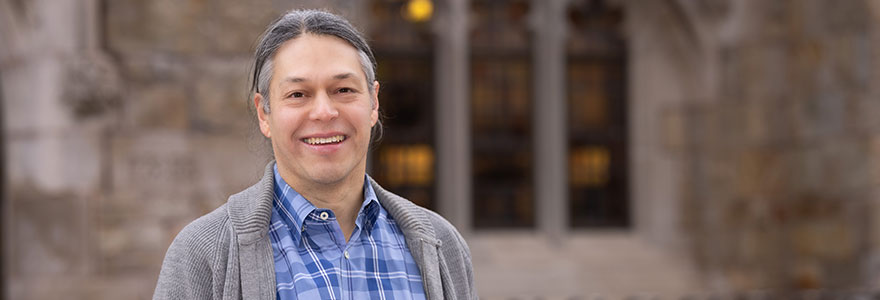News and Updates
Contact
Faculty of Social Science
Social Science Centre
Room 9438
Western University
T. 519-661-2053
F. 519-661-3868
E. social-science@uwo.ca
Examining the role of violence in the history of settler-colonialism
October 03, 2022
Photo submitted/Story by Rob Rombouts
Was genocide perpetuated against the Indigenous people of North America? And do efforts at cultural genocide continue in the United States?
Ned Blackhawk (Western Shoshone), Professor of History and American Studies at Yale, and co-director of Yale Group for the Study of Native America (YGSNA) will explore these questions through the 2022 Joanne Goodman Lecture Series at Western University.
The lecture series, entitled “On Violence and the Limits of Settler Colonialism”, looks at the role of violence in North America history, the rise in Native American and Indigenous historiography, and the continuing challenges presented by state violence.
Through the lectures, he will try to deepen the understanding of violence in the history of settler-colonialism, both from Indigenous and non-Indigenous perspectives, and consider how to apply the paradigm of genocide to Indigenous people, drawing, in part, on Canadian scholars.
The United States, he said, suffers from a national myopia when considering the use of violence. “In Canada, the country has begun to address the issue of genocide, but a similar reckoning has not happened in the U.S.,” he said. “Why have American historians been unable to approach these subjects on comparable terms as Canadian? Is there something within Commonwealth intellectual history and approaches to drawn from?”
Consideration of genocide and violence have particular resonance with contemporary issues in the U.S., which he will address in the last lecture.
Drawing upon his recent collaboration with Native American legal advocates, he will address the standing of Indian child welfare concerns recently brought before the U.S. Supreme Court. Next month it is scheduled to consider the constitutionality of a nearly 50-year old Congressional statute known as the Indian Child Welfare Act (ICWA).
“There are some issues happening now in U.S. legal system, and the child welfare system that might seem hard to believe to a Canadian mind,” Blackhawk said.
From 1950s to 1970s, up to one-third of all Native American children spent some time in adoptive services or foster services within the U.S. “This was different from residential schools, but it was still a process of assimilation,” said Blackhawk, noting how another Congressional policy known as Termination attempted to abrogate U.S. treaties during the Cold War era.
In response to a generation of reservation and urban-based Native activism, the U.S. government set in place a series of reforms through the ICWA in 1978. The act prioritized tribal rights and sovereignty over the rights of the individual. As reported on the YGSNA site, the law “plays a crucial role in protecting Native children from efforts by the United States to take potential tribal citizens away from Indian Country as a means of undermining tribal sovereignty.”
Many politicians and court systems, however, are challenging the constitutionality of ICWA, on the grounds of individual rights. In November, the U.S. Supreme Court will hear oral arguments in Brackeen v. Haaland, which is challenging the act. Working with the American Historical Association (AHA) and the Organization of American Historians (OAH), Blackhawk and the NYU-Yale American Indian Sovereignty Project, which he co-directs, prepared an amicus brief on the case, outlining the importance of ICWA in preserving tribal sovereignty and drawing attention to the long-standing efforts of federal policy makers to assimilate Native nations.
In many ways, he argues that the case, and other legal challenges against Indigenous sovereignty, are examples of the ‘ongoing colonial project.’
The Joanne Goodman Lectures will be delivered October 18-20 in the McKellar Theatre, University Community Centre, Western University. The talks will also be available via live-stream.
The Joanne Goodman Lectures were established in 1975 by the Honourable Edwin A. Goodman and his family to perpetuate the memory of their beloved elder daughter, a second year History student who died in a highway accident in April of that year. Since 1976, the Department of History and the University Students’ Council have jointly sponsored the series.
The lectures are widely recognized as being the most important history lecture series in Canada. The invitation to deliver them and the publications that result are highly regarded in this country and around the world.

